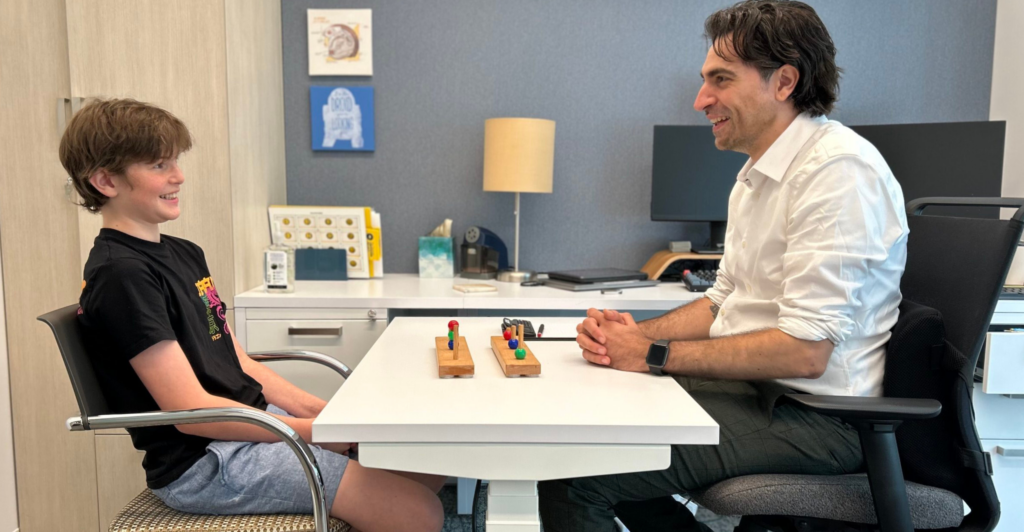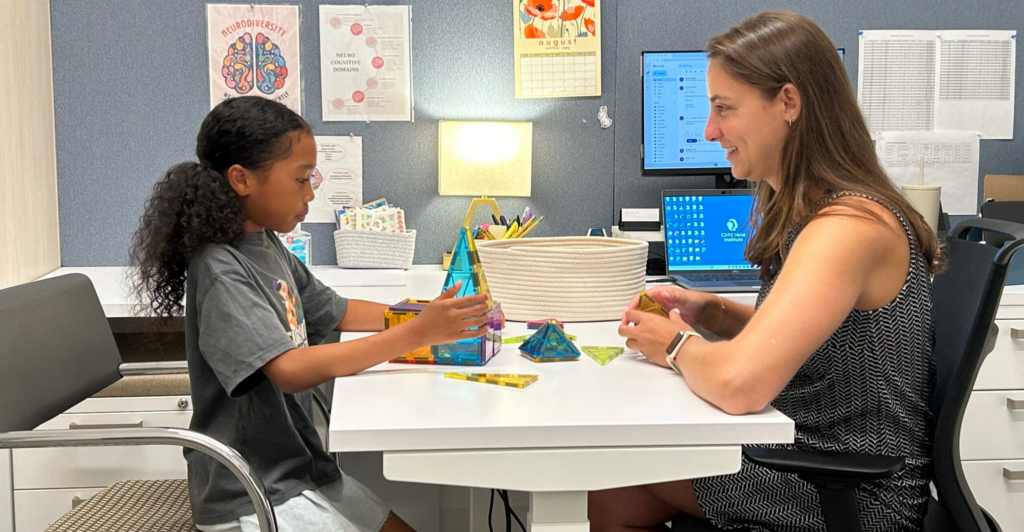Lo sentimos, la página que usted busca no se ha podido encontrar. Puede intentar su búsqueda de nuevo o visitar la lista de temas populares.
Gund Learning and Diagnostic Center
Nonverbal Learning Disability (NVLD) Service

Nonverbal learning disability is a neurodevelopmental condition characterized by deficits in processing and integrating visual-spatial information. Associated difficulties may include problems with executive functions, fine and gross motor skills, social skills, and math skills. Individuals with NVLD may have strengths in language development and verbal abilities.
Like many individuals with learning disorders, students with nonverbal learning disability (NVLD) tend to show a pattern of strengths and weaknesses in their ability to manage many environments, including in school settings.
The Child Mind Institute has a comprehensive team of mental health professionals who offer both world-class evaluations and innovative and effective support for children, teens, and young adults with NVLD. Our team includes neuropsychologists, clinical psychologists, child and adolescent psychiatrists, educational specialists, social workers, licensed mental health counselors, and speech and language pathologists.
NVLD Diagnosis and Treatment
When NVLD symptoms are the primary source of concern, we recommend either a full neuropsychological evaluation or a specialized assessment of NVLD symptoms.
- Full Neuropsychological Evaluation: This evaluation develops a detailed profile of learning strengths and weaknesses. We review intellectual functioning, language and listening comprehension, learning and memory, visual processing, motor skills, attention, social-emotional functioning, and executive functioning skills like planning and organizing. The full evaluation is required to address the complex questions about cognitive and real-world functioning tied to this condition, but also responds to questions about school placement, accommodations in the classroom and during standardized testing, and interventions that can alleviate some of the symptoms.
- Nonverbal Learning Disability Diagnostic Neuropsychological Evaluation: This targeted evaluation gathers information to support the diagnosis of a nonverbal learning disability. This involves a specialized battery of tests that include intelligence and academics, and nonverbal weaknesses in areas such as visual-spatial skills, motor coordination, social cognition and communication, and visual and tactile memory.
Feedback and Recommendations
Each of these evaluations includes feedback shared with the family and the school personnel who work with the student. We also prepare a comprehensive report documenting the findings and the diagnosis.
The individuals we see with NVLD sometimes have multiple needs, based on the specific symptoms they are experiencing.

Treatment
Because symptoms of NVLD present in so many different domains — from visual-spatial awareness to social communication — clinical interventions or school-based supports are specialized to address each of the most prominent symptom areas simultaneously. Some individuals have weaknesses in all these areas, and others in a few. Our treatment approach is individualized to address the challenges for each student.
- Social Pragmatic Communication Treatment: Our speech and language therapists have advanced training in providing social pragmatic communication and social thinking interventions to students with NVLD as well as other conditions. They develop treatment plans to help individuals become more successful aligning their social communication with their objectives. As most students with NVLD are keenly interested in others, this helps them enhance their interactions. These interventions are based on real-world encounters, where the therapist serves as a coach while guiding the interactions with another individual. These can be provided individually and in group settings.
- Academic Remediation and Organizational Skills Interventions: Our clinicians are trained in writing, math, and reading remediation and can provide remediation individually and in small groups. A therapist or educational specialist works with children to develop the skills they are missing and help devise learning strategies to build on existing strengths and compensate for weaknesses. For children who struggle with organization, we offer organizational skills training which focuses on starting tasks and working through them, as well as establishing homework routines.
- Anxiety and Mood Symptoms Treatment: Our clinicians are trained in cognitive behavioral therapy (CBT) and other evidence-based therapies, and they all have experience in working with individuals who have NVLD. Their goal is to teach individuals how to manage their own anxiety, now and in the future, and support parents in helping their children get better. Parents are an active part of treatment from start to finish.
One of the most important CBT techniques for children with anxiety is called exposure and response prevention, a well-researched, gentle, and effective way to treat anxiety. Other treatment interventions, including CBT and dialectical behavioral therapy (DBT), can be used by our clinicians to manage mood symptoms that arise as part of the NVLD presentation.
- Psychiatric Evaluation and Psychopharmacology Services: Our board-certified child and adolescent psychiatrists have expertise in the prescription, coordination, monitoring, and adjustment of medications as part of comprehensive treatment. These clinicians understand the needs of children and teens with NVLD and can tailor the approach to manage their unique symptom profile.
Specialty Programs
- PEERS® Groups for Teens and Young Adults: The Program for the Education and Enrichment of Relational Skills (PEERS®) is an evidence-based treatment designed to enhance the social skills for motivated teens and young adults. Areas of focus include making and keeping friends and building a social network.
- College Success Program℠ for Executive Functioning: Students who have been identified as having NVLD or another learning disorder may not be completely ready to handle the demands of college. Even though many colleges offer learning support resources, some students may lack the self-advocacy or executive functioning skills to effectively avail themselves of these services. Through our College Success Program℠, we position these students for success with strong self-advocacy and problem-solving skills. It starts with an intensive summer workshop to strengthen organization strategies, study skills, self-advocacy guidance, and problem-solving tools. Parents are involved in a workshop to guide them on how to support their college-aged children. Students enrolled in the program have weekly sessions with trained coaches throughout the semester to support the implementation of organizational strategies, study skills, and problem-solving once they are away at college.
- College Readiness Program for Social Emotional Skills: The College Readiness Program is an intensive three-day program designed for students preparing for college — or already enrolled in college — who need help managing new social and emotional challenges. Participants in this program learn and practice skills related to distress tolerance, emotion regulation, and interpersonal effectiveness with respect to dorm life, coursework, relationships, self-care, and time management.
Subscribe to Our Newsletters
"*" indicates required fields
This site is protected by reCAPTCHA and the Google Privacy Policy and Terms of Service apply.
